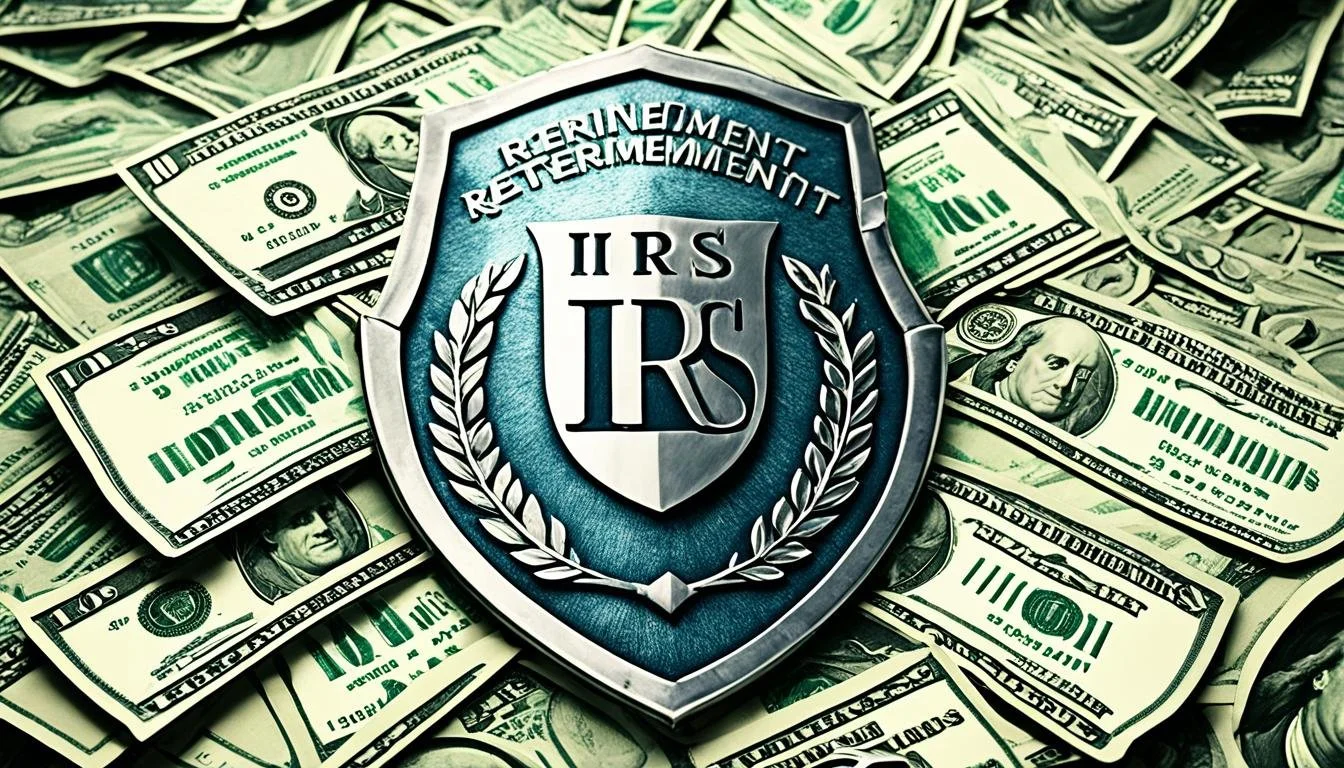Can The IRS Take Your IRA?
Worried about IRS actions on your retirement funds? Learn if and how the IRS can garnish your IRA, plus ways to protect your nest egg.
Have you ever wondered if the IRS can take money from your IRA? It's a valid concern. The IRS can indeed tap into your retirement funds. This includes your Individual Retirement Account (IRA). They can also garnish pension payments and Social Security. This is done to pay off unpaid taxes. The IRS normally avoids touching retirement funds. But, it will act if needed. It's crucial to deal with tax issues promptly. Getting help from a tax pro can also protect your savings.
Key Takeaways:
The IRS has the power to garnish your IRA and other retirement accounts to cover unpaid taxes.
Resolving your tax liability promptly can help protect your retirement savings from being seized.
Seeking assistance from a tax professional can help you understand your legal rights and explore ways to safeguard your IRA.
Options such as setting up an installment agreement or partial payment agreement with the IRS can help mitigate the risk of IRS garnishment.
Understanding the rules and regulations surrounding IRA garnishment can help you navigate the process and protect your financial future.
Can the IRS Take Your 401(k) or Other Retirement Accounts?
Do you worry if the IRS can touch your retirement funds? Yes, they can. The IRS has the right to take money from 401(k)s, IRAs, SEP-IRAs, Keogh plans, pensions, and profit-sharing plans.
But, the IRS can only take money you're allowed to take out. Rules on withdrawal and when you fully own the funds matter here.
If your 401(k) or other account is accessible to you, the IRS might take it for unpaid taxes. So, if you owe taxes and can't pay, your retirement money could be at risk.
Knowing how the IRS can touch your retirement funds is key. And it’s important to take action to keep your money safe.
Understanding the Factors That Determine IRS Garnishment of Retirement Accounts
The IRS looks at different things to decide if they can take your retirement money. They consider:
The type of retirement account you have
The withdrawal and vesting rules of your account
How much money you can currently take out
Your overall financial state and other important conditions
With this info, the IRS decides if they can use your account to pay off your tax debt.
Protecting Your Retirement Account From IRS Garnishment
Even though the IRS can grab your retirement funds, you can act to protect them. Here’s what you can do:
Settle your tax debt: Deal with your unpaid taxes to lessen the IRS garnishment risk. You might set up a payment plan, make an offer in compromise, or look into other options.
Get advice from a tax pro: If dealing with taxes and the IRS feels overwhelming, talk to a tax expert. They can help you figure out what to do to keep your retirement funds safe.
Check if your account is exempt: Some retirement accounts might not be touchable by the IRS. Know which ones are and use this to your advantage.
By being proactive and seeking expert advice, you can protect your retirement accounts from the IRS. This is crucial for your financial health.
Can the IRS Take Your Pension for Back Taxes?
If you can take out money from your pension, or if you're promised that money in the future, the IRS might use it to pay your back taxes. But if you can't withdraw now or aren't promised future funds, the IRS can't touch it. Whether the IRS can take your pension depends on your plan and situation.
Understanding the IRS Rules on Pension Garnishment
The IRS can claim your pension to cover your tax debt if you're allowed to withdraw from it. If you have access to your pension funds, the IRS may use them to settle your debt.
But if you can't currently access your pension, or it doesn't promise you future money, the IRS cannot take it. This offers some protection for your pension. Yet, IRS rules on taking pensions vary with each retirement plan. It's wise to get advice from a tax expert.
Protecting Your Pension from IRS Seizure
To keep the IRS from taking your pension, there are steps you can take.
Sort out your tax debt. It's key to deal with your unpaid taxes. You might set up a payment plan, or look into other options.
Talk to a tax pro. They can offer advice on managing your taxes and protecting your pension.
Understand your rights. Knowing the laws about pension and IRS rules helps you defend your retirement money.
By being proactive and getting the right advice, you can lessen the chances of the IRS taking your pension. Address your tax issues early and know your protection options.
IRS Seizure of Pension Examples
Retirement Plan IRS Seizure Conditions Defined Benefit Pension Plan No If you cannot make a withdrawal currently or do not have a guaranteed future right to the funds Defined Contribution Pension Plan Yes If you have the right to withdraw funds or if you have a guaranteed future right to the funds Government Pension Plan Yes Subject to the same rules as other pension plans
How Does the IRS Decide Whether or Not to Take Your Pension?
The IRS sees taking your pension as the last step. They look at other ways before taking retirement accounts. They know how crucial these funds are for your future. They only take them to clear unpaid taxes.
If your pension might be taken, you can do things to prevent it. The IRS may let you pay your taxes over time. This way, you can keep your retirement savings.
"Exploring other assets before taking your pension is a standard protocol for the IRS. They want to ensure that all other avenues have been exhausted in trying to collect the unpaid taxes."
The IRS could take your pension for several reasons. Tax fraud, not sharing needed info, or failing to lower your tax debt could be reasons. These actions could make it more likely for the IRS to act.
Understanding the IRS Pension Garnishment Decision
The IRS sees taking your pension as the last option. They consider other assets first. If you've tried to fix your tax issues, they might not touch your pension. Being open and active about your taxes is key.
Talking to a tax expert is a smart move. They can look at your situation and give advice on what to do. They can help you protect your pension and retirement savings from the IRS.
How Much Can the IRS Garnish From Your Pension or Retirement Accounts?
The IRS can seize a lot from your pension or retirement, but only what you can get to. What they take depends on the retirement account type, your money situation, and other important factors.
The IRS looks at how much you need these funds for now and later. They know these accounts are for your retirement security. They try to fix tax issues while making sure you stay financially stable.
Different rules apply to different retirement accounts for garnishing. An IRA may have different limits compared to a 401(k), for example. How much you make and spend will also affect how much can be taken.
Here's how the IRS limits can change based on account type:
Retirement Account Type Garnishment Limit Traditional IRA Up to the accessible amount, considering financial circumstances 401(k) Up to the accessible amount, considering financial circumstances Pension Plan Up to the accessible amount, considering financial circumstances
A tax pro can really help you figure out IRS garnishment. They'll guide you based on your retirement accounts and money situation. They aim to protect as much of your retirement savings as they can.
How to Protect Your Retirement Account From Being Garnished?
Keeping your retirement accounts safe from IRS garnishment is crucial for your financial future. To protect your retirement savings, you need to deal with your tax debt early. There are a few steps you may take:
Installment Agreement: A good strategy to shield your retirement account is by making an installment agreement with the IRS. This lets you pay your tax debt in smaller, monthly amounts.
Partial Payment Installment Agreement: If full payments are too much, you might get a partial payment agreement. It allows you to pay less, based on what you can afford.
Hardship Status: For severe financial struggles, you may get hardship status. This pauses the IRS's collection efforts, giving you time to find long-term solutions.
Offer in Compromise: Another way to protect your assets is an offer in compromise. It settles your tax debt for less than you owe, depending on your financial situation.
You might also qualify for other help like innocent spouse relief or penalty abatement. Getting advice from a tax expert is a smart move to figure out your best option. They can help you through the complex process.
By acting early and exploring IRS payment plans and relief programs, you can keep your retirement savings safe. This ensures a more stable financial future for yourself.
Retirement Benefits the IRS Cannot Levy
If you're worried about the IRS taking money from your IRA, you should know some retirement benefits are safe. These are protected because you can't get to them yet or they don't fit the IRS's rules.
Accounts still growing or without a set amount are safe from being taken. This means if you can't take money out of your retirement account yet, the IRS can't take it for unpaid taxes.
The IRS also thinks about what you need to live when they decide how much they can take from your retirement account. They know these funds are for your daily life and can't take them all without causing you financial trouble.
You should know that whether the IRS can take money from your retirement account might change based on your plan and situation. Talking to a tax expert or getting legal advice can help you understand what's protected.
"Retirement benefits that cannot be accessed or do not meet specific criteria are generally protected from levy." - IRS
Protecting Your Retirement Account
If the IRS taking money from your IRA worries you, you need to act to keep your savings safe. Here are ways to help:
Understand your rights: Learn about the laws on retirement account garnishment to know your protections.
Resolve your tax liability: Work to clear any tax debt to lower the risk of the IRS taking your retirement account. This might mean setting up payment plans or exploring tax relief options.
Consult a tax professional: Get advice from a tax expert who knows about retirement savings. They can offer help specific to your case and guide you through legal and financial steps to protect your savings.
By doing these things, you can shield your retirement account from IRS action and keep your savings safe for the future.
Retirement Benefits Protection Accounts in accumulation phase Protected if funds cannot be accessed or lack guarantee Accounts meeting IRS criteria Exempt from levy Funds necessary for basic living costs Considerations made to prevent financial hardship
The IRS can levy retirement accounts in some cases. However, knowing your rights, sorting out your taxes, and getting professional advice can protect your savings from the IRS.
Taxation of Levied Retirement Accounts
If the IRS takes money from your retirement account, it's vital to know the tax effects. You will be taxed at your usual income tax rate when the funds are given out. Understanding how this affects your money is crucial.
The plan administrator holds back 20% of the payout for federal income taxes. This step makes sure your tax duties are covered. Still, it's important to remember, the IRS can only take the amount left after this withholding.
"Grasping the tax results of an IRS retirement account levy is key to managing your finances well. By staying informed and proactive, you can make choices that lessen the impact and help settle your tax debt."
Important Considerations
The distributed amount from the levied retirement account will be subject to your regular income tax rate.
The plan administrator typically withholds 20% of the distribution for federal income taxes.
It is crucial to carefully evaluate the impact of the tax liability on your financial situation.
Seek guidance from a tax professional to ensure a comprehensive understanding of your tax obligations and available options.
Knowing about the tax side of levied retirement accounts helps you handle your financial duties better. And you can move towards solving them.
Conclusion
The IRS can take money from retirement accounts, but you can stop this. By solving your tax problems and getting help from a tax expert, you can keep your retirement safe. It's important to know about the IRS's solutions and your rights to avoid financial trouble.
Being quick to act is essential. Resolve your tax debt by creating a payment plan or looking into other options. This shows you're serious about following tax rules and keeping your retirement safe from the IRS.
Don't be shy about asking for help from a tax professional. They offer advice that fits your situation perfectly. They can help you navigate your options and make sure you're doing everything to protect your retirement from the IRS.
FAQ
Can the IRS garnish my IRA?
A: Yes, the IRS can take money from your IRA for unpaid taxes.
Can the IRS take your 401(k) or other retirement accounts?
A: Yes, the IRS has the power to take funds from your 401(k) and IRAs.
Can the IRS take your pension for back taxes?
A: Yes, the IRS can take your pension payments to pay off back taxes.
How does the IRS decide whether or not to take your pension?
The IRS looks at your tax debt, behavior, and other assets before taking your pension.
How much can the IRS garnish from your pension or retirement accounts?
How much the IRS takes depends on your account type and financial status.
How to protect your retirement account from being garnished?
To safeguard your retirement account, address your tax debts early and get help from a tax expert.
What retirement benefits are the IRS unable to levy?
Some accounts, especially those you can't access yet or don't meet certain rules, are safe from IRS action.
What are the tax implications of a levied retirement account?
Being taxed on the amount taken by the IRS is a result when your retirement account is levied.
What should you do to protect your retirement savings from the IRS?
Look into IRS payment plans or compromise offers and get advice from a tax professional to protect your savings.



